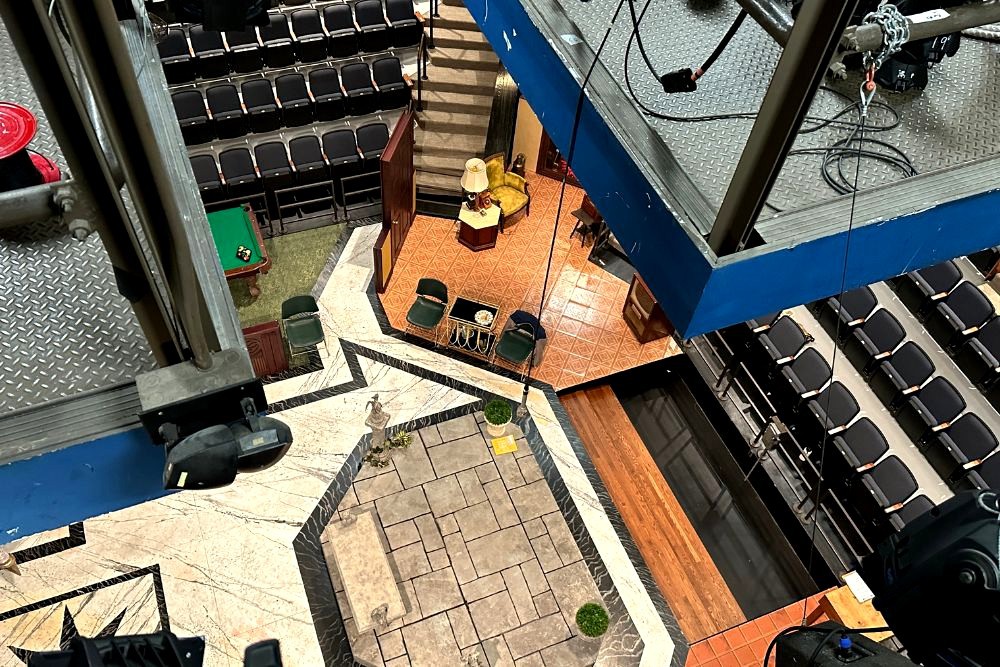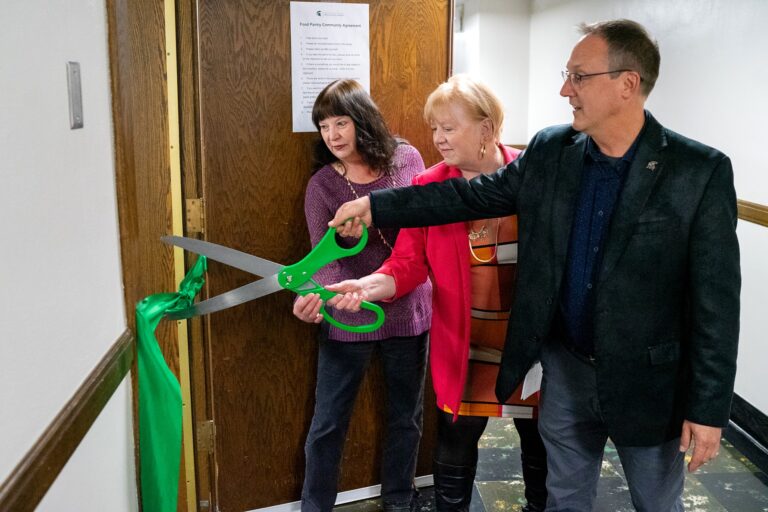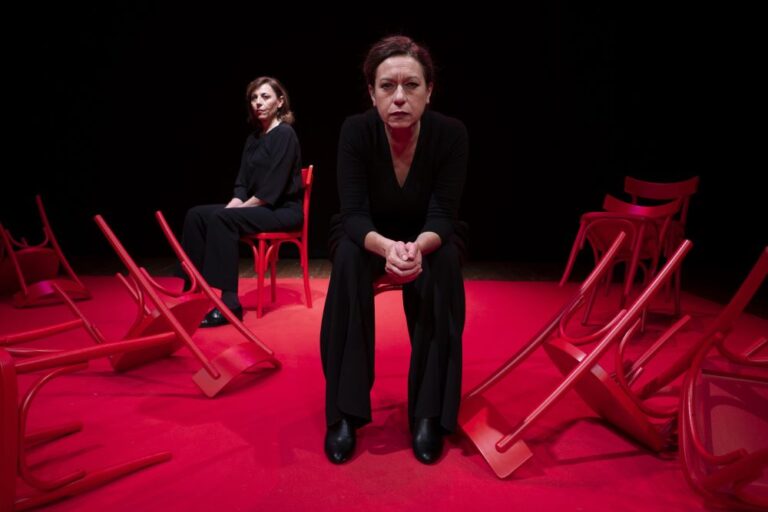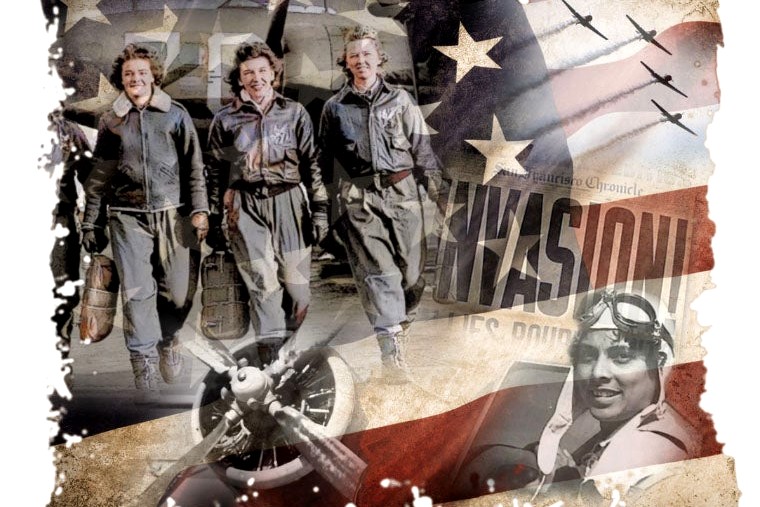Before its closing performance, Department of Theatre students had the opportunity to closely examine the incredibly technical set for the production of Clue during an all-day seminar led by three faculty members from the Scene Shop Teaching Lab. The technical seminar was the first of its kind presented by the Theatre Department, which is looking to offer other seminars like this in the future.
Conceived by Scene Shop Supervisor Levi Galloway and co-taught by Technical Director D.J. Selmeyer and Assistant Technical Director Marc White, the technical seminar was held Oct. 12 on the set of Clue at the Pasant Theatre in the Wharton Center for the Performing Arts. This five-and-a-half-hour seminar examined how the set was constructed to allow for the production’s many special effects and gave students an in-depth look at the inner workings involved in the creation of the set, which included multiple rooms and levels as well as several trick elements to aid in the mysterious plot of the show.

Based on the 1985 Paramount movie inspired by the classic Hasbro board game, Clue is a comedic farce-meets-murder mystery that is set at a remote mansion where six mysterious guests gather for a dinner party and, when their host turns up dead, they all become suspects. Audiences are left to speculate who did it, what room they did it in, and with what weapon.
During the production, which ran from Oct. 6-15, the actors interacted with each other throughout the different rooms of the set. While traveling between rooms and splitting up to search for the murderer, aspects of the set changed around them, revealing clues and facilitating movement between seemingly unconnected rooms.
“Technical theatre is a far more vast and complicated area of expertise than many people realize. It involves everything from basic carpentry to advanced welding, from rigging to mechanical/computer automation.”
Levi Galloway, Scene Shop Supervisor
“There are a lot of dynamic elements to the set,” Galloway said. “Technical theatre is a far more vast and complicated area of expertise than many people realize. It involves everything from basic carpentry to advanced welding, from rigging to mechanical/computer automation.”
The Clue team only had 16 classroom days to construct the set with deadlines that didn’t allow for in-depth explanation or exploration for students. This is the reason the technical seminar was offered, which gave the opportunity for detailed discussions and for asking questions on everything from the planning process, choice of materials and building design, to how automation and special effects work.

“From theory to practice, technical theatre takes a lifetime of learning to master,” Galloway said. “Seminars like this give students an opportunity to receive hands-on training from professionals using proven examples that are actively being used in a live performance while having the ability to ask questions about any and every aspect of how technical theatre works and why it is such an invaluable part of a production.”
Students who attended the seminar were encouraged to ask questions throughout as the three faculty who led the seminar demonstrated the construction necessary for the special effects to operate safely and effectively.
“This was a great opportunity to learn and see the set in action.”
Marcus Pennington, Theatre and Education double major
“This was a great opportunity to learn and see the set in action,” said Marcus Pennington, a senior double majoring in Theatre and Education.
The biggest draw for students was the in-depth look at three of the set’s prominent effects – the trap door in the conservatory, a moving bookcase in the library, and the descending chandelier in the foyer – and learning how these worked.
“I wanted to learn about the more intricate things on the set and was curious about how the special effects worked, especially in a play like Clue that has a bunch of secret passageways and things like that built into the set,” said Emma Justile, freshman Stage Management major.

The trap door in the conservatory was operated by a pneumatic piston that stagehands below the set controlled. On stage, however, the door appeared to be operated by a gargoyle that, when moved, caused the trap door to open. This, in turn, revealed a slide that transported actors below the stage where they could move to another room on set via one of the secret passages.
Students learned how to operate the piston system for the trap door. They also learned how the pulley and rigging systems were created to move the bookcase and chandelier from behind and above the stage. For the bookcase, the design for which was inspired by a lazy Susan, ropes attached to sheaves were used to spin a section around while magnets helped stop the rotation in the correct location.
“It was really cool to learn how they did the bookcase, especially because I saw it being built in the shop.”
Julie Clampitt, Art History and Visual Culture major
“There’s a scene where Ms. Peacock puts a book on the bookshelf, and it moves. I really wanted to learn how that works because I’ve seen it done before in touring productions and was excited to learn how to do that when you have a limited budget as compared to these multimillion-dollar Broadway productions,” Pennington said. “I also was interested in learning how the secret passageways behind the paintings opened, especially the trap door in the conservatory.”
Pennington, who, after graduation, plans to teach theatre and build sets at the high school level, continues to do a lot of work with his former high school theatre program, which is doing a production of The Play That Goes Wrong. That play has a lot of advanced building techniques, and one reason Pennington attended the technical seminar was to learn some techniques to help his high school build something more advanced.

Many of the students who attended the seminar also helped build the Clue set and enjoyed the opportunity to further explore it.
“I did a lot of the painting for the show, but I didn’t do much of the building,” said Julie Clampitt, senior Art History and Visual Culture major, who frequently works in the Scene Shop. “It was really cool to learn how they did the bookcase, especially because I saw it being built in the shop.”
“The seminar was really beneficial…Going to these things builds up a basic knowledge so you have a more well-rounded education.”
Emma Justile, Stage Management major
Clampitt said the seminar also was helpful with the take-down process since she learned where the mechanics were housed and how they were set up.
Building upon the success of this seminar, the Department of Theatre is looking to host additional sessions in conjunction with future department productions while using the catalyst of scenic designs to explore the work that goes on behind, over, and under the stage.
“The seminar was really beneficial. If you are ever a stagehand, you will know what to do if you are put in that position,” Justile said. “Going to these things builds up a basic knowledge so you have a more well-rounded education.”


